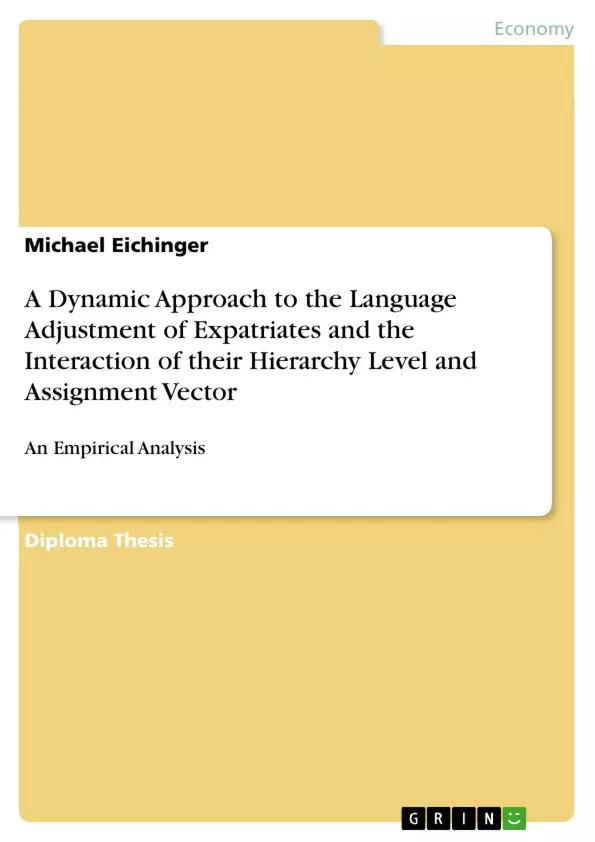Communicational antecedents obtain a supporting function for cross-cultural adjustment. Hence, this Master Thesis empirically seeks to find a divergence of language proficiency and willingness to communicate towards the adjustment dimensions and additionally investigates adjustment in the beginning of the international assignment and the current point-in-time. Furthermore, these relationships are examined on a potential interaction of the expatriates’ hierarchical position, since it has been argued that language is more important for supervisory personnel and willingness to communicate more denoted to upper management levels. The moderating effect of the assignees’ assignment vector is scrutinized in order to confirm whether the comprehensive model of international adjustment (Black et al, 1991) applies equally well to all 97 participating expatriates. Quantitative analysis revealed a positive relationship of both communication skills towards interaction and work adjustment dimension with a higher significance level at the current point-in-time and a slightly higher importance of willingness to communicate to explain the relationship. Hierarchy level and assignment vector, contrariwise, do not indicate any significant relevance on the adjustment progress.
Inhaltsverzeichnis (Table of Contents)
- Abstract
- Executive Summary
- 1. Introduction
- 2. Literature Review
- 2.1. Defining Expatriation and its Impact
- 2.2. Adjustment Processes of Expatriates
- 2.2.1. Theoretical Frameworks of Cross-Cultural Adjustment
- 2.2.2. Dimensions of Expatriate Adjustment
- 2.2.3. Antecedents of Adjustment
- 2.3. Communication Skills and Expatriate Adjustment
- 3. Methodology
- 3.1. Research Design
- 3.2. Questionnaire Design
- 3.2.1. Variables and Measurement
- 3.2.2. Data Collection Procedure
- 3.3. Data Analysis
- 4. Results
- 4.1. Descriptive Analysis
- 4.2. Correlation Analysis
- 4.3. Regression Analysis
- 5. Discussion
- 5.1. Theoretical Contributions
- 5.2. Managerial Implications
- 5.3. Limitations and Future Research
Zielsetzung und Themenschwerpunkte (Objectives and Key Themes)
This Master Thesis investigates the dynamic relationship between language proficiency and willingness to communicate, and their influence on the adjustment process of expatriates. The study focuses on the interaction between these communication skills and the adjustment dimensions of interaction, work, and general well-being. Additionally, the study explores how the expatriates' hierarchical position and assignment vector impact this relationship. Key themes include:- The role of communication skills in expatriate adjustment.
- The influence of hierarchy level and assignment vector on the adjustment process.
- The dynamic nature of adjustment over time.
- The impact of language proficiency and willingness to communicate on different adjustment dimensions.
- The implications for cross-cultural management and expatriate selection and training.
Zusammenfassung der Kapitel (Chapter Summaries)
This preview does not include any content from the conclusion or final chapter.- Chapter 1: Introduction: This chapter introduces the topic of expatriate adjustment and its relevance to international business. It highlights the importance of communication skills and explores the research gap addressed in the thesis.
- Chapter 2: Literature Review: This chapter reviews the existing literature on expatriate adjustment, focusing on theoretical frameworks, dimensions of adjustment, and antecedents of adjustment, including the role of communication skills. It establishes the theoretical foundation for the research hypotheses.
- Chapter 3: Methodology: This chapter outlines the research design, questionnaire design, and data analysis techniques employed in the study. It describes the sample of expatriates included in the survey and the methods used to collect and analyze data.
- Chapter 4: Results: This chapter presents the results of the quantitative analysis, including descriptive statistics, correlation analysis, and regression analysis. It explores the relationship between communication skills, adjustment dimensions, and the moderating effects of hierarchy and assignment vector.
- Chapter 5: Discussion: This chapter discusses the theoretical contributions, managerial implications, and limitations of the study. It proposes areas for future research and provides insights into the role of communication skills and other factors in expatriate adjustment.
Schlüsselwörter (Keywords)
This study focuses on the complex interplay between language proficiency, willingness to communicate, and various dimensions of expatriate adjustment. The research investigates the potential moderating effects of hierarchical position and assignment vector on this relationship. The core concepts explored include cross-cultural adjustment, communication skills, hierarchy level, assignment vector, and the experience of expatriates.Frequently Asked Questions
What is the focus of this study on expatriates?
The study investigates how language proficiency and the willingness to communicate influence the cross-cultural adjustment of expatriates.
How does language proficiency affect adjustment over time?
The research found a positive relationship between communication skills and adjustment, with a higher significance at the current point-in-time compared to the beginning of the assignment.
Does the hierarchical level of an expatriate matter for adjustment?
While it's argued that language is more important for supervisors and communication for upper management, the quantitative analysis showed no significant relevance of hierarchy level on the adjustment progress.
What is the "assignment vector" in this context?
The assignment vector refers to the direction of the transfer (e.g., home to host country). The study tested if the Black et al. adjustment model applies equally across different vectors.
What are the main dimensions of expatriate adjustment?
The study focuses on interaction adjustment and work adjustment as key dimensions influenced by communication skills.
- Quote paper
- Michael Eichinger (Author), 2010, A Dynamic Approach to the Language Adjustment of Expatriates and the Interaction of their Hierarchy Level and Assignment Vector, Munich, GRIN Verlag, https://www.grin.com/document/184597



